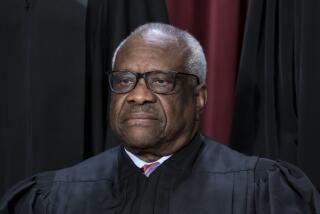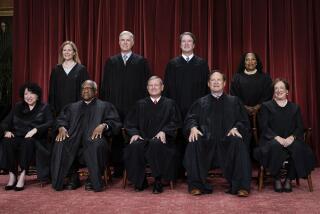Thomas Says He Was Aided by Rights Drive : Judiciary: High court nominee also praises Marshall. His comments seem designed to deflect criticism that he turned his back on the movement.
WASHINGTON — Supreme Court nominee Clarence Thomas said Tuesday that he has “benefited greatly from the civil rights movement” and from the pioneering legal work of Thurgood Marshall, the man he is likely to replace on the high court.
Thomas’ comments, made during a brief visit with Sen. Strom Thurmond (R-S.C.), appear designed to deflect criticism that, as a rising conservative star, he turned his back on the civil rights movement and ignored its role in breaking down racial barriers.
“I have been extremely fortunate,” Thomas told Thurmond in the presence of reporters. He credited the Urban League and the NAACP with helping advance his career and added a word of praise for “the justice for whom I am nominated to succeed.”
In recent years, Thomas, 43, has raised eyebrows by pointedly criticizing the views and decisions of Marshall, a preeminent figure in American civil rights law.
For example, Thomas has faulted the 1954 Brown vs. Board of Education decision because the case was built on “psychological evidence” that school segregation harmed the self-esteem of black children rather than by simply stressing that racial discrimination violated the 14th Amendment. The case was brought before the Supreme Court by Marshall, who was director of the NAACP Legal Defense and Educational Fund at the time, and is considered his greatest legal victory.
The Brown decision led to “a disastrous series of cases requiring busing and other policies that were irrelevant to parents’ concern for a decent education,” Thomas said in 1988. Those busing rulings were strongly backed by Justice Marshall.
After announcing his retirement two weeks ago, Marshall, 83, issued a thinly veiled warning about his possible successor, saying that race should not be a factor in choosing a nominee if it meant putting “the wrong Negro” on the high court.
On Monday, NAACP board members attending the civil rights organization’s annual convention were unable to decide whether to support or oppose Thomas’ nomination to the high court.
Bush Administration officials have noted that Thomas repeatedly has said that he has experienced racism and that the nation has made progress because of the civil rights movement of the 1960s.
The nominee’s comments Tuesday appeared intended to mend fences with the NAACP and other civil rights groups by reiterating his respect for the movement--and for Marshall.
His remarks were made during a courtesy call paid to Thurmond, the Senate Judiciary Committee’s senior Republican and a onetime segregationist. In 1967, Thurmond led an unsuccessful effort by Southern conservatives to block the confirmation of Marshall to the Supreme Court.
“You deserve a lot of credit. You brought yourself up by your own bootstraps,” the 88-year-old Thurmond told Thomas.
Meanwhile, Republican senators and Administration officials said it is highly doubtful that Thomas will accept an invitation to meet with NAACP leaders. “I’ve talked to others at the White House and the Justice Department, and I don’t think they’re going to recommend that he meet with any outside special interest group, no matter how important they are,” Sen. Orrin G. Hatch (R-Utah) told reporters. “It’s a bad precedent to set.”
More to Read
Get the L.A. Times Politics newsletter
Deeply reported insights into legislation, politics and policy from Sacramento, Washington and beyond. In your inbox three times per week.
You may occasionally receive promotional content from the Los Angeles Times.











